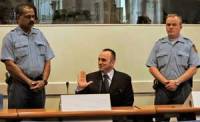Macedonian police kill ethnic Albanians
Rami Jusufi was asleep, when Macedonian police forced their way into his parents' yard. As he walked to his front door, still wearing pyjamas, he was shot in the stomach by one of the officers. He died two hours later.

Jusufi was the first of seven ethnic Albanians shot or beaten to death by police that day in the village of Ljuboten, 10 kilometers (six miles) north of the capital Skopje, in what war crimes prosecutors say was a reaction to the deaths a few days earlier of eight soldiers killed when their vehicle drove over a mine.
The U.N. court on Monday began the trial of Macedonia's former interior minister, Ljube Boskovski, and police official Johan Tarculovsky on charges of murder, wanton destruction and cruel treatment for their roles in the attack on Ljuboten.
Boskovski, who was the ultimate authority for Macedonia's police, is charged with failing to prevent or punish the crimes, while Tarculovsky allegedly masterminded and led the attack. Both men, who face maximum sentences of life imprisonment if convicted, have pleaded not guilty. The officers allegedly involved in the shootings have not been indicted.
"The police unit led by the accused Tarculovsky deliberately chose unarmed civilians, wantonly burned and destroyed many homes without justification and cruelly treated a group of residents, seven of whom were killed," said prosecutor Joanne Motoike.
The attack "clearly had a criminal design as demonstrated by the manner, method and results," she added.
The attack on Ljuboten is the only atrocity in Macedonia indicted by the U.N.'s International Criminal Tribunal for the former Yugoslavia. The country broke away peacefully from the Yugoslavia in 1991 but was racked by a six-month conflict 10 years later between government forces and ethnic Albanians fighting for more rights.
Speaking after Monday's hearing, Boskovski's defense attorney Edina Residovic called the Albanian guerrillas "terrorists" and said the former minister "took all necessary and reasonable measures."
Residovic said Boskovski ordered an investigation of the police action.
But prosecutor Dan Saxon told the three-judge panel that the Macedonian commission of inquiry concluded that the police sweep through Ljuboten was "indispensable, justified and lawfully undertaken" without carrying out a meaningful investigation.
Saxon screened a video for judges Monday which he said showed Boskovski watching the village from behind a wall several hundred meters (yards) away. Smoke rose from some houses and gunfire crackled in the background.
Another clip showed a man falling motionless to the ground as he ran across fields. He was felled by a fatal gunshot to the head after fleeing a roadblock, Motoike said.
Six ethnic Albanian men were shot dead and another was so badly beaten he died the following day, prosecutors say.
Another 100 or more ethnic Albanian men captured in the village were beaten and abused by Macedonian police. Some even were beaten by members of the public when they were taken to court and by staff at a hospital in Skopje, prosecutors say.
Many Macedonians regard the defendants as heroes. The government pledged Sunday to continue "with moral, financial and institutional support" for the two men and their families.
Prosecutors say the crimes were committed as part of an armed conflict between two well-organized, well-armed groups. Defense attorneys deny this, arguing there was no armed conflict, but a series of terrorist attacks by ethnic Albanians and efforts by government forces to stamp them out.
The defense attorneys argued in pretrial briefs that if there was no armed conflict, international laws underpinning the tribunal charges do not apply.
The Macedonian case is the last indictment issued by the U.N. tribunal for crimes committed during the bloody breakup of Yugoslavia. The court is under pressure to close its doors by 2010, even though its two most-wanted suspects, former Bosnian Serb leader Radovan Karadzic and his military chief Gen. Ratko Mladic, remain at large.
The trial adjourned until May 7, when prosecutors will present their first witness.
Subscribe to Pravda.Ru Telegram channel, Facebook, RSS!





